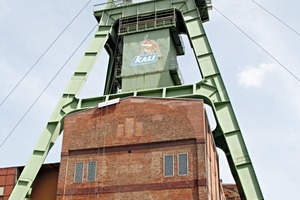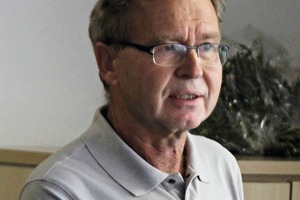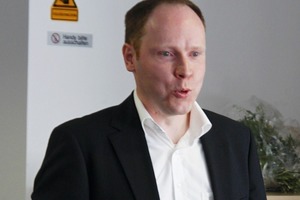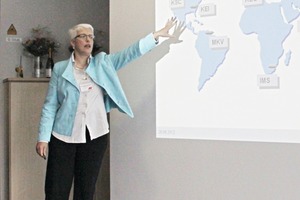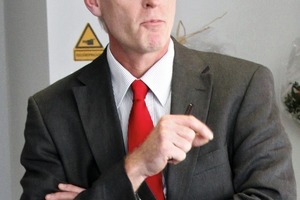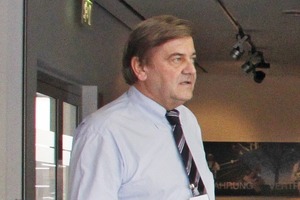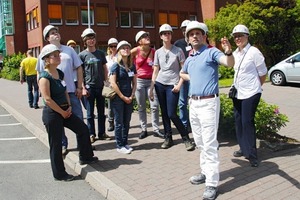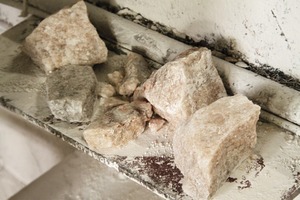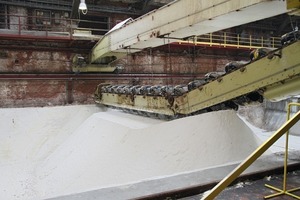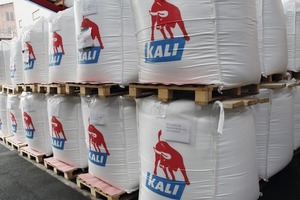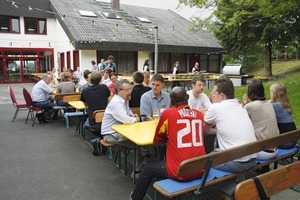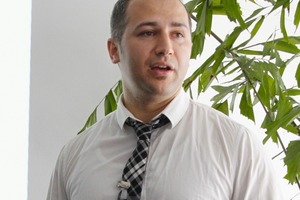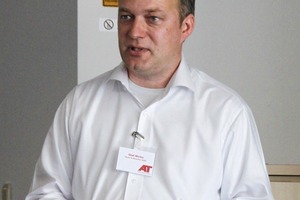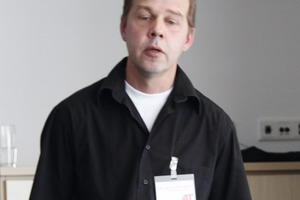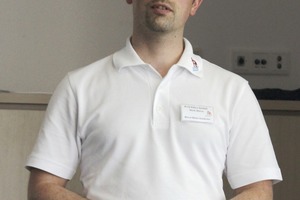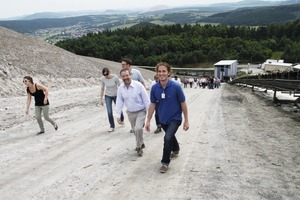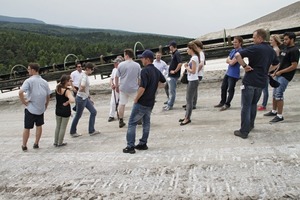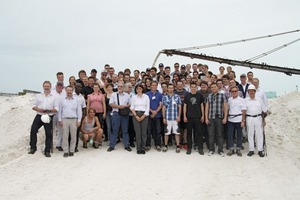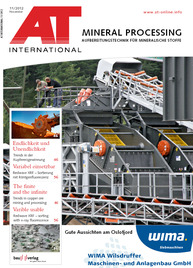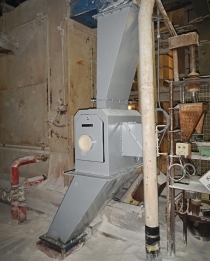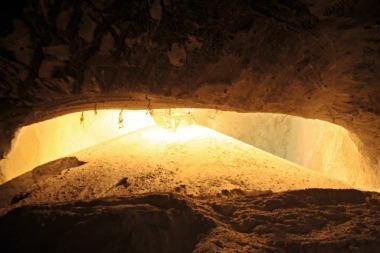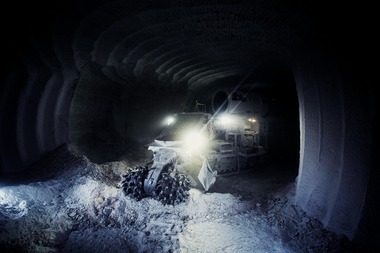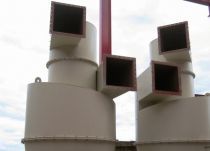Inside K+S KALI GmbH
AT Special Excursion 2012 to K+S KALI GmbH - Werra site, 26./27.06.2012
Students from the universities RWTH Aachen, TFH Bochum, TU Clausthal and TU Bergakademie Freiberg were right in the middle, i.e. right in the middle of the preparation of crude salts at the Werra site of K+S KALI GmbH. The aim of the special excursions organized by AT every year is the combination of theory and practice, i.e. the students listen to lectures about mineral processing plants and then they can visit the plants during comprehensive plant tours at which they can put questions to the accompanying specialist staff. However, above all, future fields of work for young graduates should be demonstrated both during the theoretical and practical sections of the special excursion.
The Werra site have been in existence since 1997 and consist of a combination of the former independent companies Hattorf, Wintershall, Unterbreizbach and Merkers. For more than 100 years, potash salts have been extracted here and processed to high-quality products. In the meantime the Merkers works has become an event mine for interested visitors and a venue for cultural events, e.g. concerts and the “crystal marathon” in a former tunnel 500 m underground. In the Hattorf, Wintershall and Unterbreizbach sites potash salts are extracted. The underground geographic extent of the locations Hattorf, Wintershall, Unterbreizbach and of the exhibition mine Merkers can be compared with the Munich municipal area.
The two-day special AT excursion comprised a lecture section in the morning and a practical section in the afternoon each day. An essential aim of this event is to familiarize the students with new fields of activities (which perhaps are not in the foreground during their studies) and to establish first contacts with possible future employers. For this purpose, the technical lectures are always connected with a lecture by those responsible for HRD at the participating companies explaining the career opportunities as well as the fields of activity.
The event started with an introductory lecture covering the topic “Processing of crude potash salts at the Werra site of K+S KALI GmbH”. Dr. Wolfgang Kellerer from the Werra site of K+S KALI GmbH presented the corporate structure of the global player before he addressed in detail the issue of production at the Werra site, which is a combination of the three locations Wintershall, Unterbreizbach and Hattorf.
It is mainly crude salts which are extracted from the active tunnels containing the four main minerals: sylvite (KCl), halite (NaCl), kieserite ((MgSO4 • H2O) und carnallite (KCl • MgCl2 • 6 H2O). Above ground the valuable materials are extracted, mainly potassium chlorite and a lower amount of magnesium salts by means of the three processes ‘hot dissolution, flotation and the electrostatic process (ESTA)’. The KCl is converted into K2SO4 by means of bitter salt and water. In addition to use in the food, health and industrial sector, the potash salts produced in the Werra site are mainly used for the manufacture of fertilizers.
Dr.-Ing. Björn Olaf Assmann from ThyssenKrupp Polysius AG presented “The use of high-pressure grinding rolls in the cement and mineral industries”. The high-pressure grinding rolls from the series POLYCOM are available in many different sizes and with specific grinding forces depending on the field of use. Assmann presented various projects, which have been implemented, where POLYCOM mills are used. For example, a copper ore grinding plant was installed in the Cerro Verde Mine in Peru. There are further projects in India and the USA.
Briquetting, compaction and comminution were the keywords of the lecture given by Agnes Winter-Pietruk from the Maschinenfabrik KÖPPERN GmbH & Co. KG. Compacting is the classical method for the production of fertilizers, such as potash and mixed fertilizers. A compacted cake is produced as an intermediate product by means of a roller press. In a second step it is crushed to granulate. With this process, the development of dust is reduced, better proportioning is achieved and disintegration is avoided.
The first lecture session was concluded with lectures from Siebtechnik GmbH and Steinhaus GmbH. Dr.-Ing. Jürg Pollmanns from Siebtechnik GmbH presented in detail screening and processing equipment, sampling/comminution/laboratory as well as centrifuges. Gerd Dietz from Steinhaus GmbH mainly talked about the career possibilities for engineers.
In the afternoon the about 60 students had the opportunity to visit the locations Hattorf and Wintershall in six groups with expert guidance. All processing plants were on the agenda - the grinding plant, the hot dissolution process and the ESTA system. Many special questions could be raised at the location and clarified there. Possibilities for internships or work at all the companies taking part in the excursion could be explained during the individual plant tours in a personal atmosphere.
The first day of the event was concluded with a barbecue and many interesting discussions between students, lecturers and HRD staff from the companies taking part in the event.
The next morning started with a lecture given by Dr. Peyman Oghazi covering the topic of lamella clarifiers. The basic principle is the sedimentation of solids from a suspension. This technology is used for the solid-liquid-separation, e.g. to clarify sludges. Two essential criteria of the thickening equipment are a good clarity of the liquid overflow and a maximum density of the solid underflow. With the lamella principle, various parallel, inclined plates are used to maximize the efficiency of the clarifier in relation to the available space.
After a short introduction of the group of companies, Olaf Micke from the HAVER & BOECKER Group dealt directly with the possibilities of starting a career and with various areas of responsibility of future graduates in his lecture “The areas of responsibility and possibilities of development of a project engineer in the HAVER & BOECKER Group”. He explained the activities of the group as regards the various product groups and what international projects have been implemented.
“Discharge systems for difficult bulk solids in bins and silos” was the topic of the presentation by Dipl.-Ing. Thorsten Geiser. He explained the various discharge systems and process-engineering requirements in order to find the optimum discharge system for the corresponding application.
The second lecture session was concluded by Doris Gärtner and Marcel Müller-Goldkuhle from the hosting Werra site with the presentation “Career with K+S KALI GmbH”. After some introductory explanations, Marcel Müller-Goldkuhle showed very clearly the possible career paths for students with K+S based on his own development.
The event was concluded in the afternoon with the impressive ascent of the Monte Kali (Mount Potash). Here the remains of the salt production which cannot be used commercially at present are stockpiled. The Monte Kali is approximately 200 m higher than the surrounding area. It was certainly due to the excellent organisation and support provided by the Werra site of K+S KALI GmbH, that for the students, this was a successful trip into world of crude salt extraction and processing. To name some of the many participating organizers, Dr. Jost Götte, Overground Production Manager at the Werra site, and Dipl.-Ing. Manfred Weitz, Manager of Overground Technology, should be mentioned.

